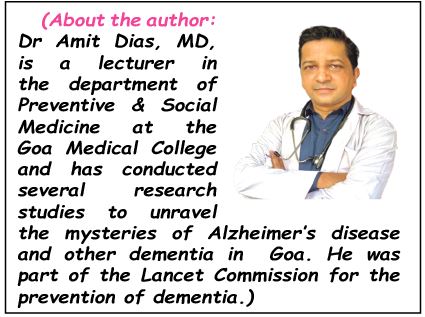World Alzheimer’s Day Special!
Have you ever forgotten your password for any website? Have you forgotten where you left your mobile? Have you ever forgotten the name of a person you met? Could this be a sign of dementia? On World Alzheimer’s Day, observed on September 21, we catch up with Dr Amit Dias who has been involved with research on Alzheimer’s disease in the state of Goa. “Memory is important, we know ourselves because of our memory, when our memory fails, we start losing our ability to stay independent,” explains Dr Dias in this thought-provoking interview….
GOAN OBSERVER: Doctor, most of us tend to forget when we grow old. Is Alzheimer’s disease a normal part of aging?
DR AMIT DIAS: Everyone should be clear, Alzheimer’s disease is not a normal part of aging — it is a disease. As people age, they may not be able to remember as well as they could while they were young. This could be normal, provided it is temporary and the person can recollect at least parts of the incident sometime later. However, in dementia, memory loss is more profound and progressive and is to such an extent that it affects the activities of daily living. Things that they used to do on a day-to-day basis such as driving, cooking, shopping, bathing and brushing becomes a challenge. Dementia occurs due to a specific pathology in the brain due to the death of brain cells or neurons due to the deposits of beta-amyloid and neurofibrillary tangles.

Q: What is dementia?
A: Dementia is not a specific disease but an umbrella term used to describe a set of symptoms that affect cognitive abilities, memory, thinking and social skills. It is caused by various degenerative conditions, such as Alzheimer’s disease, vascular dementia, Lewy body dementia, and frontotemporal dementia. Dementia is characterized by a gradual decline in cognitive function, which can eventually interfere with daily life and independence.
Q: Thanks for the clarification but can you explain a bit more about the difference between normal aging and dementia?
A: To give you an example, it is normal for someone to forget names or a word during a conversation, it happens to most of us. But a person with dementia will get lost in a conversation. They will start a sentence and may not be able to complete it.
We need our memory to make a conversation and remember new things. Recent memory is the first to get lost in dementia. They can have an informal conversation about the past, but trying to answer questions about an incident that took place recently may be difficult.
Q: Could you explain a bit more? I would like to understand when forgetfulness becomes a symptom of a disease.
A: As explained, when it affects our daily activities. Familiar tasks become a challenge. It may start with putting extra salt in the food. It is normal if it happens occasionally, but it can happen frequently if your loved one has dementia.
Q: What about forgetting passwords, etc?
A: We may forget an appointment or more recently the timing of a webinar on Zoom. That is normal. A person with dementia, will forget recently learned information and become dependent on others for help with remembering appointments.
It is normal to forget the date and look up the mobile or watch for help….we do figure it out and remember it. However, a person with dementia can completely lose track of the season date and year. There can be confusion with time place and person.
We may lose items from time to time but find them later. A person with dementia could keep items in strange places and forget about them. For example, slippers in a fridge. It is normal to have visual impairment when we grow old, but people with dementia may not be able to make sense of what they are seeing.
Q: How does one recognize Alzheimer’s disease?
A: One needs to see an appropriate doctor to get a diagnosis. Preferably a neurologist, a psychiatrist or a geriatrician.
One can look out for the 5 As
Anomia- The inability to remember the names of things
Apraxia- Misuse of objects due to failure to identify them
Agnosia- inability to recognize familiar objects, tastes, sounds, and other sensations
Amnesia– memory loss
Aphasia- inability to express oneself through speech
These can occur to varying degrees in various patients. Every person is different.
Q: What is the theme for World Alzheimer’s Day this year? And what is its significance?
A: It is a very positive theme “Never Too Early, Never Too Late”. The Lancet paper on dementia risk reduction provided the evidence on prevention of dementia. It emphasizes two important aspects. Firstly, it signifies the importance of taking preventative measures against dementia early in life. By adopting a healthy lifestyle, staying socially active, and engaging in mentally stimulating activities, we can reduce the risk of dementia. Secondly, it emphasizes that it’s never too late to make positive changes to support individuals who are already living with dementia. Early diagnosis, support from family and friends and access to appropriate care can significantly improve the quality of life for individuals with dementia.
Staying socially engaged, continuing to learn and challenge the mind, and getting enough sleep also is vital in reducing the risk. In short, what is good for the heart, is also good for the brain and should be followed.
Q: What is your message for our readers?
A: The message is simple and clear. It’s never too early and never too late to start dementia risk reduction strategies. There should be no excuse. We can delay and potentially reduce up to 40% of all dementias by targeting the known risk factors changing lifestyle and engaging in mentally stimulating activities. Do not forget people who cannot remember and at the same time do not forget their caregivers who make a huge difference in their lives.

